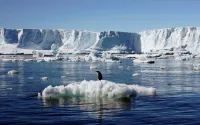15 September 2006
For most people in the West, climate change threatens their lifestyles. For the people of Bangladesh, climate change threatens their very lives.
The impact is being felt now. The mangrove swamps are dying because the sea level is rising and the salt water is poisoning them. People are being displaced because of rising sea levels, caused in part by the dramatic melting of the Arctic icecaps, caused in turn by climate change.
Even if the Kyoto protocol were fully implemented immediately, or even if not a single gram of carbon dioxide were emitted anywhere in the world again, we already have a planet that is damaged and in which climate has been altered.
In Bangladesh the future has arrived; we have environmental refugees, because our country is unusually vulnerable to climate change. Some 70 per cent of the country consists of flood plains, and most is less than 6m above sea level. If there is a 1 per cent increase in average global temperatures, we will lose about 10 per cent of our land. That is a huge problem for Bangladesh.
Being a huge delta with the Ganges and the Brahmaputra flowing into the Bay of Bengal, Bangladesh has always had to live with widespread floods. Our people have developed coping strategies to deal with them. Normally, we can do so. But with climate change the temporary flooding we see during the wet season is becoming permanent.
That might not be such a problem were Bangladesh not so densely populated. Yet there are about 150 million people occupying 144,000 square kilometres of land; or more than twice the population of the UK in not much more than half the space. Climate change will eventually threaten 30 to 40 million lives in Bangla-desh. When these people's homes and crops are flooded forever, where will they go? What will they do? What will they eat? There will even be a shortage of fresh drinking water.
Climate change critically affects every aspect of our lives. Although we have enjoyed strong economic growth of 5 per cent to 6 per cent recently and have become more self-sufficient, this progress is threatened by environmental degradation caused by others.
Lives in Bangladesh will be devastated though no fault of the people concerned. We are not causing the climate change that is killing our people. The average Bangladeshi produces .3 tons of carbon dioxide per annum; the average citizen in the world's biggest polluting nation, the United States, produces 20 tons of CO2 each year. So as well as calling on all the world's rich nations to reduce emissions and tackle that challenge now, we also know that a certain amount of irreversible change is upon us.
For that reason, we must have help from our development partners with resettlement and adjustment for millions of our citizens. I repeat; their lives are being damaged through no fault of their own, but by the actions of others thousands of miles away. It is to them and their governments that we turn to help us. We need to look beyond Kyoto.
We hope that the biggest polluting nations of today, as well as the emerging economies who may be the biggest polluters of tomorrow, will listen to the warnings issued by former vice-president Al Gore in his film An Inconvenient Truth, and by Sir David King, the British Government's chief scientific adviser, who said that climate change was "the most severe problem we are facing today". In some parts of the world it is even now a matter of life and death.
High Commissioner for Bangladesh and former permanent secretary at the Bangladeshi Environment Ministry
http://comment.independent.co.uk/commentators/article1603631.ece






